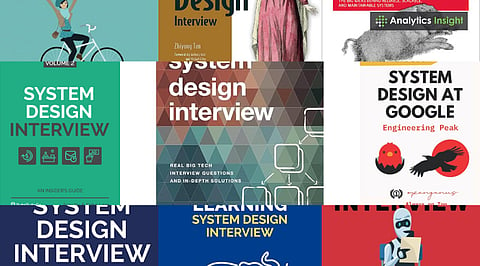

Discover essential system design principles and scalable architecture concepts.
Learn through real-world examples, case studies, and problem-solving exercises.
Prepare effectively for system design interviews and modern software engineering challenges.
Applications like Instagram, Gmail, and Amazon effortlessly manage millions of users in today's digital world. The secret to their smooth operation lies not just in coding, but in effective system design. This important discipline focuses on how different parts, modules, and interfaces work together to create systems that are maintainable, efficient, and scalable.
For aspiring developers aiming to work at leading tech companies, mastering system design has become essential. In addition to coding skills, it requires a solid understanding of architecture, the ability to evaluate trade-offs, and the capability to solve real-world problems. The best system design books for developers bridge this gap by providing theory, examples, and practical exercises.
System design involves creating a roadmap for software systems. It defines how different components of the system interact with each other. At the same time, it ensures scalability, optimal performance under high loads, and alignment with business requirements. At its core, system design focuses on developing efficient, reliable, and future-proof systems.
Here are a few reasons why developers should read system design books:
Comprehensive Knowledge: Know the heart of concepts, methodologies, and patterns in the design of advanced systems. Sample words or phrases may appear in implementation.
Real-World Insights: The examples and case studies demonstrate the theory in practice.
Decision-Making Skills: Become proficient in trade-offs involving scalability, performance, and reliability.
Problem-Solving Practice: Exercises and situations hone critical thinking for addressing design issues.
Technical Communication: Enhance vocabulary and confidence when talking about system architecture.
Hands-On Learning: Diagrams, projects, and assignments provide real-system practical exposure.
Here are some pointers to help you select the best books on system design:
Teaches good problem definition and good scoping of problems.
Has a fair number of sketches and architecture diagrams for visualization.
Uses simple English to explain design language and design rules.
Gives real-world examples and trade-offs in product architecture.
Contains meaty exercises that reinforce learning.
Also Read: Best R Programming Books for Beginners and Experts (2025)
Below are the seven best computer books that cover everything from scalable software architecture to distributed systems:
Author: Martin Kleppmann
A contemporary classic, Designing Data-Intensive Applications delves into distributed systems, databases, and big data technology. Kleppmann explains concepts such as consistency, fault tolerance, and scalability through practical scenarios. Thus, it is a must-have among the top system design books for developers.
Price: Rs 1,750
Authors: Eric Freeman & Elisabeth Robson
Through a graphical narrative, this fascinating book makes object-oriented patterns and design principles easy to grasp. Head First Design Patterns guides programmers in developing maintainable and reusable code and is a sweet and best-selling computer design book from which one can learn about software patterns.
Price: Rs 9,979
Authors: Mark Richards & Neal Ford
Spanning architecture patterns, component design, and evolutionary architecture, Fundamentals of Software Architecture blends technical concepts with soft skills such as presenting designs and working across teams. A must-read for developers wanting to grasp the larger picture.
Price: Rs 4,683
Author: Alex Xu
Designed for interview preparation, System Design Interview – An Insider’s Guide features 16 real system design interview problems with 188 diagrams. It instructs developers on how to write down system boundaries, make design decisions, and solve interview questions efficiently: the best system design book, a favorite among top developers’ best books.
Price: Rs 3,064
Authors: Dennis, Wixom, & Roth
System Analysis and Design includes case studies, projects, and examples that illustrate the system analysis and design methodology. Perfect for start-up and intermediate learners, it’s among the top computer design books for introductory knowledge.
Price: Rs 13,544
Authors: Titus Winters, Tom Manshreck, Hyrum Wright
Software Engineering at Google provides an inside look at Google’s engineering culture, focusing on scalable coding, trade-offs, and handling large codebases. To developers, it’s a goldmine on real-world system design and software engineering, one of the top system design books.
Price: Rs 4,102
Author: Scott Tilley
Scott Tilley covers system design evolution, agile methodologies, cloud computing, and mobile apps. Practicing projects and exercises ensures that developers can implement knowledge in real-world contexts, making it yet another best computer design book to read.
Price: 12,189
Also Read: Top 10 Books to Ace Coding & Programming Interviews in 2025
System design engineers should have these books on their shelf if they want to gain practical knowledge, sharpen their problem-solving skills, and prepare themselves for real-world issues and interviews. In 2025, through dedicated study, application, and practice, individuals can attain a deep understanding of complex systems and establish a system architecture with a strong foundation.
1. What is system design?
System design involves planning software architecture, components, and interactions to ensure that systems are scalable, efficient, and maintainable from a user perspective.
2. Why are system design books important?
They convey principles, patterns, examples, problem-solving, trade-offs, etc., to foster architects' evolution and interview readiness.
3. Who should read system design books?
Developers, software engineers, and technology students who wish to understand architecture or want to scale applications or prepare for system design interviews.
4. What skills do system design books enhance?
They enhance architecture comprehension, scalability planning, problem-solving, technical communication, trade-off analysis, and enable envisioning actual system implementation.
5. How to choose the best system design books?
They must contain practical case studies, diagrams, exercises, latest practices, and implementation guidance along with theory.
